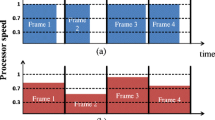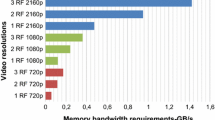Abstract
In comparison with the relatively slow progress of battery technology, semiconductor memory has improved much more rapidly, making storage a less critical limiting factor in designing low power embedded systems such as PDAs. To exploit such technology trends, we present a novel framework, a joint encoder–decoder framework (JEDF), which allows the decoder to tradeoff energy and memory consumption without sacrificing playback quality. We employ sum-of-powers-of-two (SOPOT) technique, an approximate signal processing (ASP) technique, in an MPEG AAC decoder to reduce the computational workload. The SOPOT introduces additional ASP noise (in the decoder) on top of the quantization noise introduced in the process of lossy compression (in the encoder). The sum of these two kinds of noise may become audible when it exceeds the masking threshold. We tackle this problem from a new perspective: the proposed JEDF allows the ASP and quantization noises to be shaped jointly to match the masking threshold. In the case that the perceptual room between the masking threshold and the quantization noise is insufficient for the ASP noise, the JEDF can reduce the quantization noise level which results in an increase in bitrate. To implement the proposed scheme, we have developed two new techniques: (1) SOPOT truncation noise shaping; (2) truncation noise allocation based on a perceptual model. Experimental results show the effectiveness of our approach.
Similar content being viewed by others
References
Argenti F., Del Taglia F., Del Re E.: Audio decoding with frequency and complexity scalability. IEE Proc. Vis. Image Signal Process. 149(3), 152–158 (2002)
Benini L., Micheli G.D.: System-level power optimazation: techniques and tools. ACM Trans. Des. Autom. Electron. Syst. 5(2), 115–192 (2000)
Chan S.C., Yiu P.M.: An efficient multiplierless approximation of the fast fourier transform using Sum-of-Powers-of-Two (SOPOT) coefficients. IEEE Signal Process. Lett. 9(PART 10), 322–325 (2002)
Ghurumuruhan G., Prabhu K.M.M.: Fixed-point fast hartley transform error analysis. Signal Process. 84(8), 1307–1321 (2004)
Huang, W., Wang, Y., Chakraborty, S.: Power-Aware bandwidth and stereo-image scalable audio decoding. In: ACM Multimedia Conference. Singapore, pp. 291–294 (2005)
Hu Z., Wan H.: A novel generic fast fourier transform pruning technique and complexity analysis. IEEE Trans. Signal Process. 53(1), 274–282 (2005)
ISO/IEC (2000) MPEG1 11172-3: Audio Coding
ISO/IEC (2006) MPEG2 13818-7: Advanced Audio Coding
James D.V.: Quantization errors in the fast fourier transform. IEEE Trans. Acoust. Speech Signal Process. ASSP-23(3), 277–283 (1975)
Liu, C.M., Lee, W.C., Chien, C.T.: Bit allocation for advanced audio coding using bandwidth-proportional noise-shaping criterion. In: International Conference on Digital Audio Effects (DAFX). London, pp. 233–237 (2003)
Liang J., Tran T.D.: Fast multiplierless approximations of the DCT with the lifting scheme. IEEE Trans. Signal Process. 49(12), 3032–3044 (2001)
Markel J.D.: FFT pruning. IEEE Trans. Audio Electroacoustics AU-19, 305–311 (1971)
McMillan, L., Lee, W.: A forward-mapping realization of the inverse discrete cosine transform. In: IEEE Data Compression Conference. Snowbird, Utah, USA, pp. 219–228 (1992)
Mesarina M., Turner Y.: Reduced energy decoding of mpeg streams. Multimed. Syst. 9(2), 202–213 (2003)
Oppenheim, A., Nawab, H., Verghese, G., Womell, G.: Algorithms for signal processing. In: Rapid Prototyping of Application Specific Signal Processors Conference (RASSP). Arlington, Virginia, USA, pp. 146–153 (1994)
Oppenheim A.V., Weinstein C.J.: Effects of finite register length in digital filtering and the fast fourier transform. Proc. IEEE 60(8), 957–976 (1972)
Simplescalar/Arm: http://www.simplescalar.com/v4test.html
Tajana, S., Micheli, G.D., Benini, L., Mat, H.: Source code optimization and profiling of energy consumption in embedded systems. In: International Symposium on Systems Synthesis. Madrid, Spain, pp. 193–199 (2000)
Trevor M.: Power: a first-class architectural design constraint. IEEE Comput. 34(4), 52–58 (2001)
Wang Z.: Pruning the fast discrete cosine transform. IEEE Trans. Commun. 39(5), 640–643 (1991)
Zheng, F., Garg, N., Sobti, S., Zhang, C., Joseph, R., Krishnamurty, A., Wang, R.: Considering the energy consumption of mobile storage alternatives. In: IEEE/ACM International Symposium on Modeling, Analysis and Simulation of Computer and Telecommunication Systems. Orlando, USA, pp. 36–45 (2003)
Author information
Authors and Affiliations
Corresponding author
Additional information
Communicated by Cormac Sreenan.
Rights and permissions
About this article
Cite this article
Huang, W., Wang, Y. A joint encoder–decoder framework for supporting energy efficient audio decoding. Multimedia Systems 15, 101–112 (2009). https://doi.org/10.1007/s00530-009-0152-6
Received:
Accepted:
Published:
Issue Date:
DOI: https://doi.org/10.1007/s00530-009-0152-6




